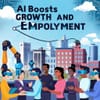The article argues that contrary to some alarmist narratives, the rise of Artificial Intelligence (AI) does not inevitably mean mass job losses — rather, it can enhance productivity and expand employment if managed well. As firms adopt AI tools more widely, there is potential for faster growth in output and employment, especially when technologies complement human labour instead of simply replacing it. According to the authors, the key to a positive outcome lies in ensuring the benefits of AI spread broadly rather than being captured by a few dominant firms.
In the Indian context, the article highlights that while AI adoption presents strong opportunities for increasing productivity, it also poses risks — particularly if the adoption becomes highly concentrated among a few large players. Firms empowered by AI may gain significant market power, driving more output but fewer jobs if competition is weak. The authors caution that for employment gains to materialise, policy must emphasise competition regulation and support for firms that integrate AI in ways which complement human labour.
The piece further explores how, globally, the impact of AI on jobs depends heavily on the structure of the economy and its labour market. For example, in economies with older populations and slower workforce growth, AI acts more strongly as a productivity booster. By contrast, in younger economies such as India’s — with large cohorts of new entrants into the job market — the risk of automation displacing routine or middle-skill jobs is more pronounced if AI is not paired with strong labour-market and education policies. While the article doesn’t focus solely on India, its implications are highly relevant to India’s employment and growth challenges.
In conclusion, the article posits that AI’s net effect on employment isn’t pre-determined as negative or positive. It depends on how technology diffusion is managed, how labour markets adjust, how education and skilling evolve, and how competition and market structure are regulated. For India, this means that favourable employment outcomes from AI will require proactive policy: ensuring that AI adoption is widespread rather than concentrated, that workers are equipped with the skills to work alongside AI, and that firms are incentivised to create new tasks rather than simply automate existing ones.


